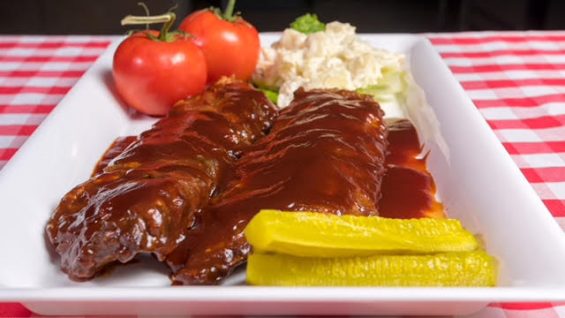Women in Business Q&A: Lorraine Jones of 92nd Sauce
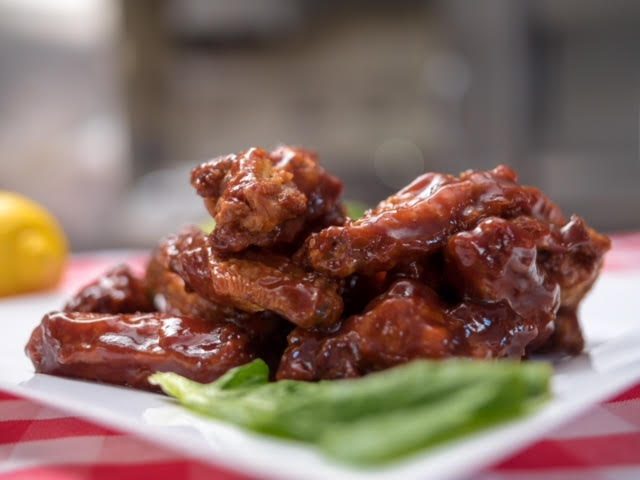
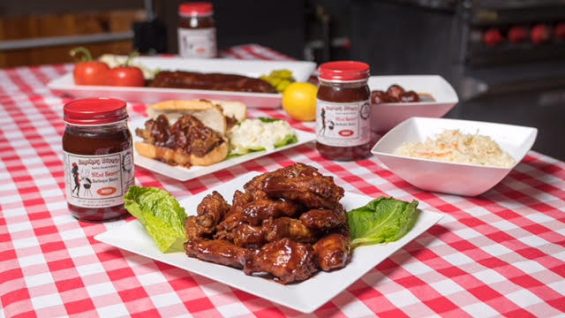
In some parts of the country—namely Kansas City, Memphis, South Carolina, and pretty much anywhere in Texas—barbecue isn’t just a tasty cuisine, it’s also a spectator sport. Festivals are planned and thousands gather to watch the most dedicated to their grilling craft compete for bragging rights, and sample the delicious results. So while Berkshire County, Massachusetts, may not be on that list of barbecue-crazy regions, Lorraine Jones is on a mission to change that. By the looks of it, she’s going to get there a lot faster than anyone would have thought.
Jones and her mother, Penny Walker, and sister, Dawn Ross, are the owners of 92nd Sauce, a spicy-tangy-sweet, homegrown barbecue sauce first made and served by Walker’ mother, the late Dorothy Everett Turner, at her wildly popular Oakland, California, restaurant, Everett & Jones, back in 1973. Everett & Jones, which now boasts five locations, is the longest-running African-American owned business in Oakland, and is still an all-in-the-family affair.
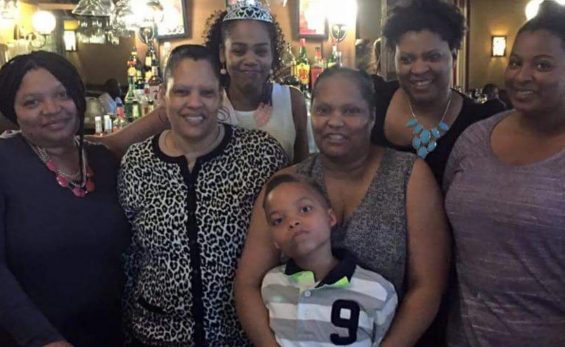
The Jones family. Front row, left to right: Dawn Ross (co-owner), Arnetta Sandifer, Pennie Walker (co-owner) Chace Ross, Olivia Jones.
Back row, left to right: Stefanie Williams and Lorraine Jones (owner).
The sauce made the trip out east a few years ago when Jones’ aunt approached the women about continuing the family legacy. Despite their lack of food-industry experience, Jones, Walker, and Ross were game. And after some recipe reworking and testing, they launched 92nd Sauce, a modern-day, health-conscious iteration of Turner’s original recipe. The sauce comes in a trio of heat levels and is sold online; at a variety of local specialty grocers’, including Berkshire Co-op, Guidos, and Berkshire A&E, as well as at local Big Y’s; and at Sherwood Shops and Wildflower Pantry in Boston.
I sat down with Lorraine to talk about running the family business, how her approach has changed, and some exciting plans for the (near) future.
Robin Catalano: Tell us about how the company first started.
Lorraine Jones: It started in 1973 in Oakland, California. My grandmother Dorothy Everett Turner and her nine children were living in Oakland. She had separated from my grandfather and was trying to figure out how to support her family. She used to work at Flint’s Barbecue, so she had learned the barbecue business from the inside. She borrowed $700 from her friend and opened a restaurant in an abandoned building. She would always tell us, “I never thought I’d make more than $3 an hour,” yet she built this business herself and was successful enough to keep it going for 30 years and support her whole family.
RC: What’s your background?
LJ: I went to Syracuse University and graduated in 1996 with a degree in biology. Most recently I’ve been working as a project manager in tech support for a software company. I didn’t work in the family business initially, except in the summer when I would go visit. My aunt Annie Pearl approached us a few years ago about taking over the business. She taught me about the business and how to make the sauce.
At first it was scary. I like to cook and entertain, but it was just a hobby; I didn’t have the professional experience. But my scientific background actually helped. When it came time to scale the recipe up for manufacture, I was able to work out the formula. People usually hire a food scientist for that, so it saved us a lot of time and money. I also wanted to take out the corn syrup and gluten and add natural sweeteners and thickeners that would appeal to a wider, more health-conscious audience.
RC: 92nd Sauce is amazing—full of flavor and really versatile. That’s coming from someone who’s never been a big barbecue fan! What makes it special?
LR: It’s the love, our wanting to carry out the legacy. We’re very careful about where we source our ingredients from. We don’t look for cheapest; we stick with quality ingredients from reliable sources, and source locally when possible. We have higher ingredient costs because of this, but for us it’s worth it.
And whereas other commercial barbecue sauces are cooked and pasteurized quickly and tossed in the bottle, we cook ours over about three hours, to really let the flavors develop. It’s complex, with a sweetness, a blend of medium and hot spices, and smokiness.
RC: Is the sauce vegan?
LJ: It’s made in a shared kitchen, so we’re not able to get a vegan designation, but we use all vegan ingredients.
RC: What do you hope customers get from using your products?
LJ: I hope they get an appreciation for the story and the legacy—it’s remarkable, and I’m really excited to carry it on. In addition to making some great-tasting sauce!
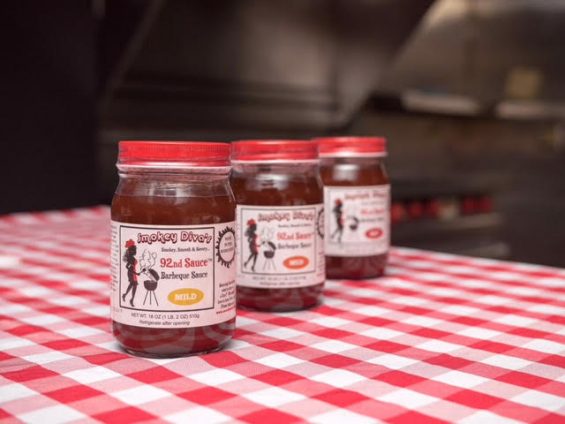
RC: What were the most challenging parts of getting the business off the ground?
LJ: Getting started. I felt a little alone in the beginning. How to get something from an idea to manufacture—I didn’t know any resources in the community for that. I did a lot of a research and made a lot of mistakes in the early stages.
One day, a Google search led me to Franklin County Community Development Corporation. They were having a session for new entrepreneurs, so I went. I connected with them immediately, and they helped me the rest of the way. They helped us set up product testing, hooked us up with glass manufacturers for the bottles, showed us what recall plans were and how to track ingredients that go into the sauce, in case there’s a recall on any of them. Once we got to the manufacturing stage, we connected with 1Berkshire, which has been very helpful, as well.
RC: What has changed most about you as a businessperson since you first started?
LJ: I’ve definitely become more humble. At first I really came out of the gate confident—“I can do this!”—but setbacks and mistakes taught me to accept help, to realize I don’t know everything. When you’re a small business owner, you have to be prepared to fail, and fail often, and fail early.
At the time it seemed catastrophic. For example, I had picked out jars and spent a lot of money on printing labels. When they started to do the production run, the labels were too big for the jars. The bottles looked terrible. We had to reprint the labels and do it again. That was a pretty big lesson.
RC: What do you think are your biggest accomplishments in business?
LJ: Getting the sauce onto the shelves of a major retailer was a huge accomplishment. Persistence pays off!
I usually start by reaching out with an e-mail introducing myself. That doesn’t get much of a response; buyers get a lot of e-mails. The next step is a phone call; then I go in person. Once I get a yes to samples, I know I have a good shot. I keep a color-coded spreadsheet of who I’ve contacted, who wants samples, and when to follow up after delivering samples.
Online is a little harder. It’s tough to get people to try a product they haven’t tried yet. In person, at a store or a farmers’ market, we can do a tasting, and those often convert to sales.
RC: What has surprised you the most about making a business around 92nd Sauce?
LJ: The level of community support. Berkshire County has really showed us a lot of love. I was born here and raised here; the Berkshires are my home. It’s nice to have a cheering section.
RC: How many hours do you typically work in a week? Is there any particular task that you love…any that you could do without?
LJ: I work full-time at my primary job and probably 20 to 30 hours a week with 92nd Sauce, so it’s a 60- to 70-hour week. Weekends and evenings are usually reserved for shipping, marketing, farmers’ markets. I’d like to go full-time eventually, but I’m playing by ear on when.
I really like doing demos and talking to the customers and hearing their reactions and suggestions. I don’t take those as critiques; I take them as useful criticism that makes the product better.
I don’t like doing all the paperwork. I hate filing for permits, registrations with the FDA—that kind of thing. Everyone says I’m really organized, but I could do without this stuff!
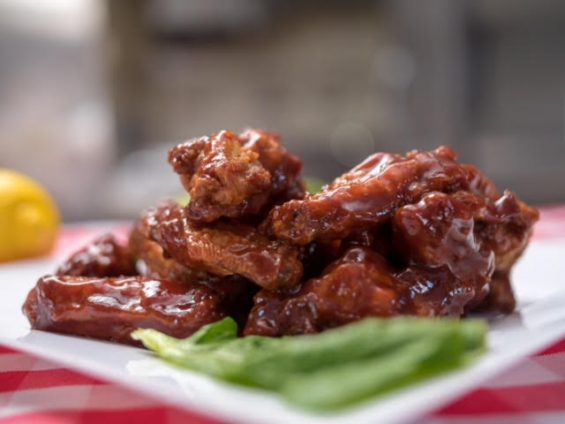
RC: What type of marketing do you do?
LJ: Mostly social media—Facebook and Instagram. We also do a lot of event marketing, like Third Thursdays in Pittsfield and other festivals. We bring the grill and put on a show. When people taste the sauce on ribs, that’s a big driver of sales.
We know we need to do other things, though. I’d like to try regional commercials. But when you’re a small business, your advertising budget is also small.
RC: Did you ever have a moment where you thought This is too hard or I’m done? How did you work through it?
LJ: Oh yeah. When you’re new at it, you do have those moments. But you sleep on it; then it’s a new day, and you approach it with a fresh mind. When I take a step back, that’s usually enough.
RC: What’s on the horizon for you and 92nd Sauce?
LJ: We’ve just opened a kitchen and restaurant, Smokey Divas, on Onota Street in Pittsfield, near the lake. We really want to pay homage to my grandmother, the godmother of all barbecue.
RC: How do you creatively recharge?
LJ: I love to spend time with family and friends. Sometimes I’ll go to visit my sister in Boston for a day or two, or go to a paint-and-sip or wreath-making class with friends. Being around them makes me happy and is a big stress reliever.
RC: What’s the worst (or least useful) piece of business advice you’ve ever been given, and what’s the best?
LJ: The best advice I’ve gotten is “Fail early and fail often.” We definitely did, but it was so important. You want to make those mistakes early, when you can still adjust the business.
The worst advice I’ve heard is, “Go big or go home.” You want to work at a level you can manage and not get yourself into something you can’t handle. Scale up in a controlled manner, and you’ll be more successful than if you just throw everything into it and see what happens.
